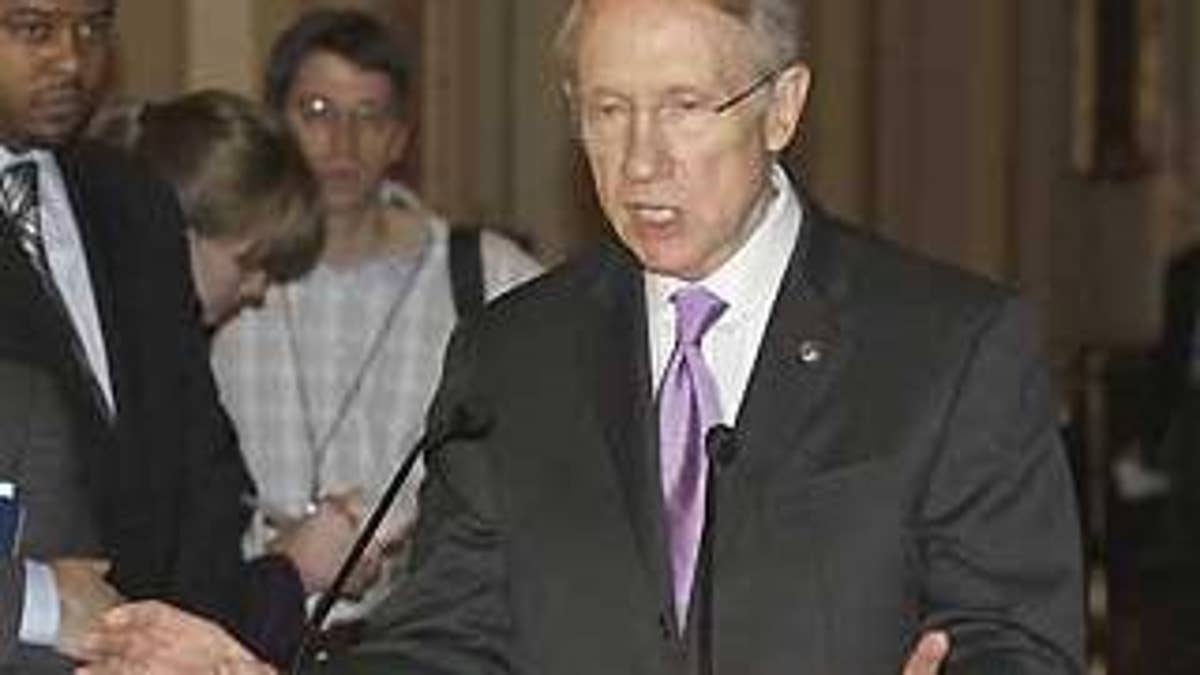
Senate Majority Leader Harry Reid is holding the option of using a legislative maneuver to create not only a sweeping overhaul of the nation's health care system but also a controversial cap and trade energy program, a move that could torpedo bipartisanship.
The maneuver, known as "reconciliation," protects legislation to which it's attached from a Senate filibuster. Republicans, in their deep minority status, are in an uproar over the possibility that they will be all but eliminated from the legislative process.
But Republicans are not alone in their opposition. A sizable number of Democrats have protested the move; first and foremost, Budget Committee Chairman Kent Conrad, D-N.D., who excluded it from his committee's budget passed Thursday.
The House has reconciliation instructions in its budget for health care, and Reid left open the door Thursday to adding energy protections as well.
"We're leaving nothing off the table," Reid told reporters Thursday, a move that has touched off a firestorm of concern behind the scenes.
So concerned about the possibility of it being used, Sens. Robert Byrd, D-W.V., and Mike Johnanns, R-Neb., sent a letter of strong protest to the majority leader.
As opponents of proposed cap and trade measures, Byrd, the Senate's most senior member and lead watchdog of Senate rules and decorum, and Johanns told Reid, "Enactment of a cap-and-trade regime is likely to influence nearly every feature of the U.S. economy.
"Legislation so far-reaching should be fully vetted and given appropriate time for debate, something the budget reconciliation process does not allow. Using this procedure would circumvent normal Senate practice and would be inconsistent with the Obama dministration's stated goals of bipartisanship, cooperation, and openness," they wrote.
Conrad and Byrd are not the only Senate Democrats opposed to using reconciliation. Sen. Ben Nelson, D-Neb., said he is prepared to vote against the final budget if it returns from House-Senate negotiations with the restriction.
Nelson is part of a group of 15 moderate Democrats concerned about levels of spending and growing deficits. They are set to meet Tuesday to discuss how to move forward on the budget.
Sen. Judd Gregg, R-N.H., top Republican on the Budget Committee, said Wednesday that reconciliation is not always a bad thing. He supported it when President Bill Clinton wanted tax increases to pay down the debt. But Gregg draws the line at creating major changes in environment and health care laws.
"When you are taking the entire health system of the United States, restructuring it, changing it fundamentally, moving it to the left significantly, basically nationalizing it for all intents and purposes ... without any opportunity for changes on the floor of the Senate, well, you might as well not have a Senate. You might as well just have a House of Representatives. It totally undermines the purposes of the two branches of government," Gregg told FOX News.
Republicans are not exactly strangers to using the reconciliation process to create new programs. They tried to open drilling in the Alaska National Wildlife Refuge in 2005, with Gregg telling reporters at the time: "The president asked for it, and we're trying to do what the president asked for."
Former President George W. Bush got his massive tax cuts through the Senate, as well, when Republicans used the reconciliation tool.
But Gregg defended those uses.
"It has always been on issues on policies which already exist -- adjusting tax laws, adjusting tax rates, affecting this program that already exists or that program."
If reconciliation is returned in the budget after House-Senate negotiations, it appears Reid still might have trouble meeting the lower voting threshold of 51 votes for approval. Still, Senate Minority Leader Mitch McConnell, R-Ky., said he sees a possible strategy where Reid could pull it off.
McConnell said Reid could bring in Vice President Biden, in his capacity as president of the Senate, to break any tie vote, thereby allowing Reid a loss of up to nine Democrats.
If reconciliation is approved, something that is not at all certain, Reid has said he might not use the power.
The leader said he still wants to give Senate Finance Committee Chairman Max Baucus, D-Mont., point man on health care reform, "an opportunity to see what he can do on a bipartisan basis."
But Reid's dangling of the reconciliation carrot is sure to stir a hornet's nest of criticism.
"That is like waving a flag in front of a bull, for both Republicans and Democrats. He has no idea how his rhetoric reverberates through this place. It's like your own members are struggling with this bill and then you say you're going to go hyper-partisan and turn this place upside down?" asked a senior Senate Republican leadership aide.




